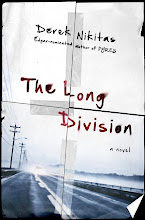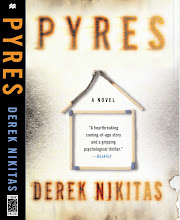Weekly short story workshop at college interrupted by a fire drill. Two hundred English-major mopes expelled from the hallowed hall, now slouching around the quad waiting for the all-clear. We’re huddled in a circle of writers: Peter, me, Karen, Melissa, Sarah. It’s like fifty, cold for Atlanta. Used to be I could do thirty, no chill. Not anymore. Two years in the ATL and my blood is thin.
Sarah bemoans her own short story, soon to be workshopped. Pete goes, “Am I the only one here who loves his own work?”
Dead silence. Uuuummmm. Somebody nods.
I go, “That’s like asking, am I the only one here who masturbates?”
Pete’s cool. He takes it in stride. He chuckles. He used to live in Las Vegas, but he doesn’t look like anybody you’d think of as somebody who used to live in Las Vegas. Is he the only one here who loves his own work?
My immediate impulse: yes, Pete, you are. Ain’t nothing I despise more than my own writing at its worst. It makes me livid, fit for suicide watch. When your chemistry is set to spark only when you strike upon the lyrical, you’re going to be dumps most of the time. Sorrow abides more so than the dude abides, if you ask me. I can’t take a compliment for shit because I think: you don’t know how good it could’ve been, man, you don’t know the dream I had, the one even the sharpest revision chisel couldn’t chip out of the block. I love what could’ve been.
If I loved my writing, why do I dread it? If I loved it, why would I want it fixed even long after it’s published? If I loved, why would I accept rejection slips like valentines and dread that acceptances are clerical errors at the lit mag office? “Oh, crap, sorry man, we had the wrong guy.” If, why then have I thrown away ten times more than I’ve ever dared disseminate? Why do I wake every morning in fear that I’ve lost forever whatever limp shred of talent I had?
But who am I kidding? There’s got to be some love in this or else I’m a freak for dragging on so long with two dead limbs. Is it just false modesty for me or anybody but Peter to say my work makes me sick with disappointment and terror? Yeah. So what do I love, if not the writing?
I want to quote somebody else, don’t remember who: “I hate writing but I love having written.” But that ain’t true either. When the writing’s going good, ain’t no better drug in the world. And there’s nothing worse than having written shit. One of my undergrad creative writing profs, Judith Kitchen, once gave a speech about the thirteen agonies and the one ecstasy of writing. The agonies include: gestation, drafting, revision, submission, rejection, publication, galleys, reviews. The one ecstasy is the moment. That fleeting few minutes when your rationale bleeds away and there’s nothing but pure language between your subconscious and your fingertips on the keyboard. I believe that’s true. It can happen in revision, too, but it’s still true.
So why all this agony for a fleeting ecstasy? And can you really love something that offers so little reward, so much pain? What kind of idiot would keep hacking at it, except an obsessive? ‘Fraid I got nothing but questions today, folks. That and a few tentative answers.
Here’s the thing: I don’t want to say I love my writing a) because I grew up New England Proddy. Our arms don’t bend right for self-reflexive back-patting, except when we boast about how humble we are. And b) because when the writing goes right it doesn’t seem mine. Me, who I am, my conscious mind, my analytical process—all that mucks up good writing. Nothing comes of it but that which must be tossed or reworked, sometimes to death.
When the writing goes right it roils up like steam from a manhole, a sudden burst of warmth from below that you couldn’t have expected. Where it comes from isn’t me. It’s the collective unconscious. I love the hunt and the hope and the sense of having caught it for an instant, but I don’t love the wait and the empty hands I get nine times out of ten.
I’m a mystery writer of sorts, though I’ll admit resistance to and contention with the whole enterprise. Mysteries are a means to an end, not an end in themselves. Mysteries mean plots, but I don’t love my plots. I don’t love anybody’s plots. Those are candy, dumb distractions. Glue on the flytraps. Sure, I fancy myself clever when I fashion the age-old twist, the Aristotelian reversal or revelation, but the self-congratulation doesn’t last more than a minute before the doubt sets in: “you schmuck; that’s so contrived.” Got a couple of those in Pyres just to give the story structure and drive. The killer’s motivations, the surprise betrayal, etc. etc. Kids’ gloves.
It’s not the plots—it’s the mysteries of character that bubble up from them, the blips of truth I find when I seek deep inside their heads in those moments of pure stark life I get when I plop them down on the road in the path of the oncoming semi truck. It’s those moments they come alive, apart from and above all my silly sleight-of-hand plotting. I make up the stories, and if I’m damn lucky my characters will tell me who they are. It’s them—not me, not my writing—I love.
E.M. Forster, a Brit, (even worse than a NE Proddy) recommends the following regretful attitude: “Yes—oh, dear, yes—the novel tells a story. That is the fundamental aspect without which it could not exist. That is the highest factor common to all novels, and I wish that it was not so, that it could be something different—melody, a perception of the truth, not this low atavistic form.” (emphasis mine, but the quote is his, from Aspects of the Novel).
For Forster, any idiot can throw together a story, a narrative to keep the reader guessing. For God’s sake, cavemen could fucking do it. Anybody who’s proud of the plot he’s fashioned might want to consider what source he stole it from. The cutest metaphor Forster can devise for story is a tapeworm: “For the more we look at the story. . . the more we disentangle it from the finer growths that it supports, the less shall we find to admire. It runs like a backbone—or may I say a tapeworm, for its beginning and end are arbitrary. . . . It is the lowest and simplest of literary organisms.”
Granted, Forster makes some distinction between story and plot, but he’s still got his point. It’s the “melody. . . perception of truth . . . the finer growths” that matter. Those I love: those stream of language that work better than any plan I could’ve made, those resonances of imagery or character that I could not have anticipated, those truths I didn’t know were true until a character told me so.
I’m not saying I don’t control my characters. I admit, I’m one of those goddamn plodding plotters. But when I can I let my characters think and emote for themselves, and sometimes I love what they show me. It’s not something I create, it’s just something I notice only after it appears. Where it comes from? Not a clue, but it ain’t me, and I don’t love what I alone can do.



1 comment:
"I hate writing. I love having written." That was Dorothy Parker, and I love her, but yeah, the more I write the less satisfaction I get from the finished product. It kinda seems all one to me anymore: inspiration, process, trying to get published. But that feeling, that you're a factory, can be oddly satisfying.
Sorry, I don't know you -- was just following links. But I did enjoy this!
Post a Comment